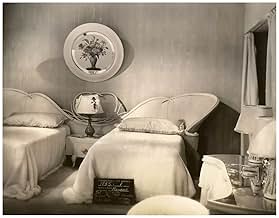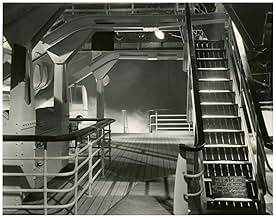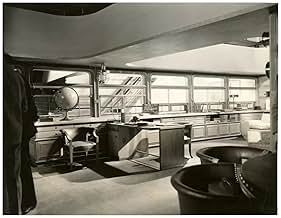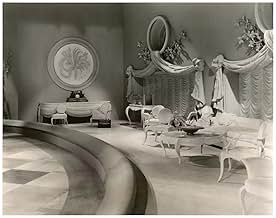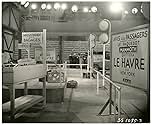AVALIAÇÃO DA IMDb
6,7/10
1,4 mil
SUA AVALIAÇÃO
Adicionar um enredo no seu idiomaA woman pretends to be royalty in order to get aboard a cruise ship.A woman pretends to be royalty in order to get aboard a cruise ship.A woman pretends to be royalty in order to get aboard a cruise ship.
- Direção
- Roteiristas
- Artistas
Monya Andre
- Undetermined Role
- (não creditado)
Benny Bartlett
- Ship's Bellhop
- (não creditado)
Virginia Cabell
- Undetermined Role
- (não creditado)
George Chandler
- Film Man
- (não creditado)
David Clyde
- Assistant Purser
- (não creditado)
Keith Daniels
- Reporter
- (não creditado)
Avaliações em destaque
Carole Lombard and Alison Skipworth are masquerading as a Swedish princess and her lady in waiting who are sailing to Hollywood to make a film. This is a bit of self ballyhoo that chorus girl Lombard from Brooklyn is giving for her film debut. Still band leader Fred MacMurray is intrigued by her.
Of course slimy blackmailer Porter Hall tries a little touch on both MacMurray and Lombard, MacMurray having done a stretch in jail as a juvenile. Later when Hall winds up murdered in Lombard's cabin, MacMurray moves the body and searches for the real killer. His only clue is that Hall had told him he had a third blackmail prospect on board the ship.
Easier said than done because also sailing on the ship are five police detectives from different countries on the way to a convention in California. When Hall's body does turn up, they all want to have a little competition as to who can crack the case first.
Sounds like a serious plot, but in fact it's a pretty breezy comedy with MacMurray and Lombard at their sophisticated best. One thing that was fascinating in the plot was that Mischa Auer and Sig Ruman being from the Soviet Union and Nazi Germany are playing detectives from the NKVD and the Gestapo respectively though that's hardly mentioned. Both are without their usual methods of investigation on the American cruise ship as is Tetsuro Komei for the Japanese. British Scotland Yard man Lumsden Hare and Surete detective Douglass Dumbrille round out our quintet of sleuths.
Best in the supporting cast is Hall as the blackmailer though. Also good is George Barbier as the ship's captain and William Frawley who a quarter of a century later would co-star with Fred MacMurray in My Three Sons is MacMurray's agent.
This was the second of four films MacMurray and Lombard did for Paramount in the Thirties. They were a good team together and don't get as much recognition as they should.
Despite the Thirties fashions and music, the film holds up very well today. It's Carole Lombard at her best.
Of course slimy blackmailer Porter Hall tries a little touch on both MacMurray and Lombard, MacMurray having done a stretch in jail as a juvenile. Later when Hall winds up murdered in Lombard's cabin, MacMurray moves the body and searches for the real killer. His only clue is that Hall had told him he had a third blackmail prospect on board the ship.
Easier said than done because also sailing on the ship are five police detectives from different countries on the way to a convention in California. When Hall's body does turn up, they all want to have a little competition as to who can crack the case first.
Sounds like a serious plot, but in fact it's a pretty breezy comedy with MacMurray and Lombard at their sophisticated best. One thing that was fascinating in the plot was that Mischa Auer and Sig Ruman being from the Soviet Union and Nazi Germany are playing detectives from the NKVD and the Gestapo respectively though that's hardly mentioned. Both are without their usual methods of investigation on the American cruise ship as is Tetsuro Komei for the Japanese. British Scotland Yard man Lumsden Hare and Surete detective Douglass Dumbrille round out our quintet of sleuths.
Best in the supporting cast is Hall as the blackmailer though. Also good is George Barbier as the ship's captain and William Frawley who a quarter of a century later would co-star with Fred MacMurray in My Three Sons is MacMurray's agent.
This was the second of four films MacMurray and Lombard did for Paramount in the Thirties. They were a good team together and don't get as much recognition as they should.
Despite the Thirties fashions and music, the film holds up very well today. It's Carole Lombard at her best.
Combining the elements of a great screwball comedy with a murder mystery,Paramount again cast the great team of Carole Lombard and Fred MacMurray.Carole a down-on-her-luck publicity hungry actress enlists the aid of wise-cracking hefty Alison Skipworth and together they sail aboard a luxury liner en route to America.Lombard pretending to a Swedish princess befriends Fred MacMurray and pal William Frawley and all four form an uneasy alliance.Matters become complicated when Carole is suspected of murdering a blackmailer who knew her in Brooklyn.A pack of zany international detectives attempt to solve the crime in their bumbling fashion while MacMurray tries to find the murderer before he strikes again. This fine little comedy is ably directed William K. Howard with a wonderful supporting cast led by George Barbier(ship captain) suspects Porter Hall,Douglas Dumbrille,and egocentric detectives Sig Rumann,Mischa Auer,and Tetsu Komai.Surefire fun.
'The Princess Comes Across' was billed as 'a curious blend of comedy, murder-mystery, romance and music'; the 'curious' is certainly without question, but the degree to which the mix blends is, I feel, open to some doubt.
On the whole this is mainly satisfactory from the comedy angle. The sole musical element consists of casting our hero, played by Fred McMurray, as a concertina-player, a choice of instrument guaranteed to provide humour by its plebeian contrast to royalty. McMurray also sings a spoof ode to his concertina at the obligatory onboard musical evening that gathers all the murder suspects together -- save one! -- to stage the climax to the mystery plot. Unfortunately the solution to the latter turns out to be extremely lame, the plot line having been again almost totally subjugated to the need for laughs, and chiefly providing an excuse for the introduction of four stereotyped comedy detectives -- the dapper Frenchman, the pompous Prussian, the pipe-smoking Englishman and the devious Russian -- and an opportunity to implicate Carole Lombard's Swedish princess.
Lombard's haughty impression of the princess who just wants to be left alone is the main selling-point of the film, and the difficulties this role places in the way of romance with her cocky concertina artiste, 'King' Mantell, provide most of the rest of the comedy. Filmed through a gauzy lens, she has perhaps never been more beautiful, and the script handles her predicament with sympathy, but this one gimmick isn't quite enough in the end to carry off the rest of this mish-mash of a film.
Ultimately I felt that it strains at too many different goals and falls short of most of them: its worst actual defect is the hand-waving denouement to the detective plot, which is of a nature to embarrass Agatha Christie at her most contrived, but the climax to the romance also somehow struck me as arbitrary and unsatisfactory, given how hard her character has defended her increasingly impossible situation throughout the rest of the film. Again, I get the feeling that the plot demands of the comic and romantic set-up respectively are pulling in conflicting directions rather than forming a happy blend.
Not a long-lost classic, but a curiosity, perhaps; worth seeing for Lombard's title performance, but ultimately less than a harmonious whole.
On the whole this is mainly satisfactory from the comedy angle. The sole musical element consists of casting our hero, played by Fred McMurray, as a concertina-player, a choice of instrument guaranteed to provide humour by its plebeian contrast to royalty. McMurray also sings a spoof ode to his concertina at the obligatory onboard musical evening that gathers all the murder suspects together -- save one! -- to stage the climax to the mystery plot. Unfortunately the solution to the latter turns out to be extremely lame, the plot line having been again almost totally subjugated to the need for laughs, and chiefly providing an excuse for the introduction of four stereotyped comedy detectives -- the dapper Frenchman, the pompous Prussian, the pipe-smoking Englishman and the devious Russian -- and an opportunity to implicate Carole Lombard's Swedish princess.
Lombard's haughty impression of the princess who just wants to be left alone is the main selling-point of the film, and the difficulties this role places in the way of romance with her cocky concertina artiste, 'King' Mantell, provide most of the rest of the comedy. Filmed through a gauzy lens, she has perhaps never been more beautiful, and the script handles her predicament with sympathy, but this one gimmick isn't quite enough in the end to carry off the rest of this mish-mash of a film.
Ultimately I felt that it strains at too many different goals and falls short of most of them: its worst actual defect is the hand-waving denouement to the detective plot, which is of a nature to embarrass Agatha Christie at her most contrived, but the climax to the romance also somehow struck me as arbitrary and unsatisfactory, given how hard her character has defended her increasingly impossible situation throughout the rest of the film. Again, I get the feeling that the plot demands of the comic and romantic set-up respectively are pulling in conflicting directions rather than forming a happy blend.
Not a long-lost classic, but a curiosity, perhaps; worth seeing for Lombard's title performance, but ultimately less than a harmonious whole.
The plot of this movie seems rather crazy. After all, Carole Lombard plays an American who can't get a job in Hollywood, so she pretends to be a Swedish princess (sort of like a royal version of Garbo) and is adored--and offered a film contract. Now you'd think this is a totally ridiculous idea, but in real life just a year later, Samuel Goldwyn introduced a Norwegian sensation--Sigrid Gurie. Unfortunately, when it was found out that Gurie was born in Brooklyn (exactly like Lombard's character), it didn't exactly help her film career! Now you'd think that having Lombard playing a rather broad Garbo impersonation would be silly, but because she was such a likable actress and it's such a cute film, they manage to carry it off well.
The film begins with Lombard coming aboard an ocean liner with a lot of hubbub from the press--after all, they think a princess is on her way to America. Once aboard, band leader Fred MacMurray falls for her and pursues her. However, unexpectedly, the comedy becomes a murder mystery--and both MacMurray and Lombard are suspects. However, MacMurray also knows that she was the victim of a blackmailer who was just murdered--and he knows she has something to hide. There's much more to the film than this, but you can just see it yourself--it's worth it.
Overall, the film works well because the writing is very good and the actors have nice supporting character actors on hand--such as William Frawley, Douglas Dumbrille and Sig Ruman. Plus, the ever slimy Porter Hall made for a great blackmailer. Clever and most enjoyable from start to finish.
Oh, and I must point out that this film allows the viewer to hear MacMurray Crooning! His voice, though a tad weak, was actually far better than I expected and was rather reminiscent of the singing of Dick Powell.
The film begins with Lombard coming aboard an ocean liner with a lot of hubbub from the press--after all, they think a princess is on her way to America. Once aboard, band leader Fred MacMurray falls for her and pursues her. However, unexpectedly, the comedy becomes a murder mystery--and both MacMurray and Lombard are suspects. However, MacMurray also knows that she was the victim of a blackmailer who was just murdered--and he knows she has something to hide. There's much more to the film than this, but you can just see it yourself--it's worth it.
Overall, the film works well because the writing is very good and the actors have nice supporting character actors on hand--such as William Frawley, Douglas Dumbrille and Sig Ruman. Plus, the ever slimy Porter Hall made for a great blackmailer. Clever and most enjoyable from start to finish.
Oh, and I must point out that this film allows the viewer to hear MacMurray Crooning! His voice, though a tad weak, was actually far better than I expected and was rather reminiscent of the singing of Dick Powell.
The main reason to see this fun, if slowly paced, comedy-mystery is to see a glowing Carole Lombard do an hilarious impersonation of Greta Garbo. She plays an American actress pretending to be a Swedish princess - and Carole has a ball sending up Garbo in the process. Also great to get a glimpse of pre-WW2 politics, with the detectives on board coming from all over the globe - including Germany, Russia and Japan. Great fun. What a shame we don't all travel by boat still!
Você sabia?
- CuriosidadesThe working title of A Princesa de Brooklyn (1936) was "Concertina."
- Erros de gravaçãoIt's possible that Fred MacMurray can play the concertina, but when he is singing and playing, his fingers do not move. Also, he moves the bellows in and out when there is no concertina music.
- Citações
Lady Gertrude Allwyn: The story is from a novel entitled Lavender and Old Lace, but the name of the cinema has been changed to... um... She Done Him Plenty.
- ConexõesReferenced in Os Ídolos Também Amam (1976)
- Trilhas sonorasMy Concertina
(1936) (uncredited)
Music by Phil Boutelje
Lyrics by Jack Scholl
Played during the opening and end credits
Played on a concertina and sung by Fred MacMurray at the concert
Principais escolhas
Faça login para avaliar e ver a lista de recomendações personalizadas
- How long is The Princess Comes Across?Fornecido pela Alexa
Detalhes
- Data de lançamento
- País de origem
- Idiomas
- Também conhecido como
- The Princess Comes Across
- Locações de filme
- Empresa de produção
- Consulte mais créditos da empresa na IMDbPro
- Tempo de duração
- 1 h 16 min(76 min)
- Cor
- Proporção
- 1.37 : 1
Contribua para esta página
Sugerir uma alteração ou adicionar conteúdo ausente


